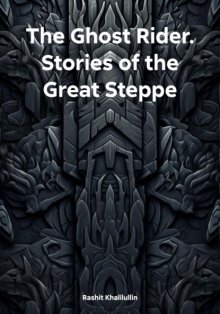The Ghost Rider. Stories of the Great Steppe бесплатное чтение

With a creak of hinges, accompanied by the hiss of compressed air, the door of the intercity Ikarus closed, cutting off the warm interior. The bus turned on its turn signal and winked with its brake lights, turned off the curb onto the highway and, picking up speed, rolled away. Spitting on the frozen ground, Roman pulled up the slipped strap of his bag and walked away from the bus stop on the frozen ground.
The rolled grader road led from the intercity highway to his native village, whose houses were nestled at the foot of the hills, winking at the rare lights of the midnight watchmen who were awake at that time. To go was about five kilometers, as once, for the sake of interest, measured on the speedometer of the motorcycle. The full, blindingly white moon illuminated with heavy light the night road covered with snow. The penetrating breeze, typical for November, tingled his cheeks, not allowing him to stand still, and pulling his autumn cap deeper, Roman walked along the road.
The air felt the approach of winter. It seemed that not today, so tomorrow the snow would tightly cover everything around, hiding the frozen bumps of the fall steppe until spring. Roman had come from the city, where he studied at the college, to buy winter clothes – a thin fall jacket, although it looked fashionable, but did not warm well. The last bus left the station late in the evening and after three hours of driving, dropped him off on the highway in the dead of night. Roman spat again, moving his legs briskly, though he wished he'd listened to his mother and gone at night.
A concrete bridge led over a wide canal, and the boy stopped and leaned over the railing, gazing into the heavy, dark water.
The canal stretched for four hundred and fifty kilometers from the Irtysh River to the city of Karaganda, feeding numerous villages and hamlets with its water along the way. And what fishing was on the reservoirs, Roman smiled.
He kicked a pebble with his foot, watched it fall into the water and crossed the bridge and walked on. The road stretched on, through the dark steppe, occasionally making turns. Roman walked on, humming a cheerful song to himself. In an hour he would be home, drinking hot tea and ducking under a thick, warm blanket. And in the morning, when he woke up, his mom would cook something delicious. It was always like this when he came home, missing him for the three or four weeks he was away. Studying in a foreign city was easy, only the landlady couldn't replace his mom.
Roman smiled involuntarily at her concerns. Mom asked him not to come on the last passing bus. It was not safe to walk in the dark night through the deep deserted steppe. Different stories were told, and not always people made up.
This spring someone had a habit of accosting people arriving late at night, riding up on horseback, knocking them down and carrying off their belongings. Really, it was only with people who weren't met by a car. They could never find who was doing it. Only there was a little oddity – sometimes stolen things were found then abandoned in the steppe, and in the neighboring village, there were rumors of a missing girl who came late at night, but never made it home. She just disappeared and that was it.
Roman remembered all those conversations and a cold shiver ran down his spine. He did not consider himself a coward, but from these stories involuntarily became frightening. And then…
In the night steppe noise is always heard at a great distance. And the boy could not understand whether his imagination had played a cruel trick on him or whether he had really heard the sound of iron clinking against stone. Roman stopped and listened.
The steppe always, even now, had a life of its own at night. Its deafening stillness seemed ghostly. If he listened, he could hear the wind howling in the grass, the cracking of the ground from the cold, the splash of waves on the nearby river.
